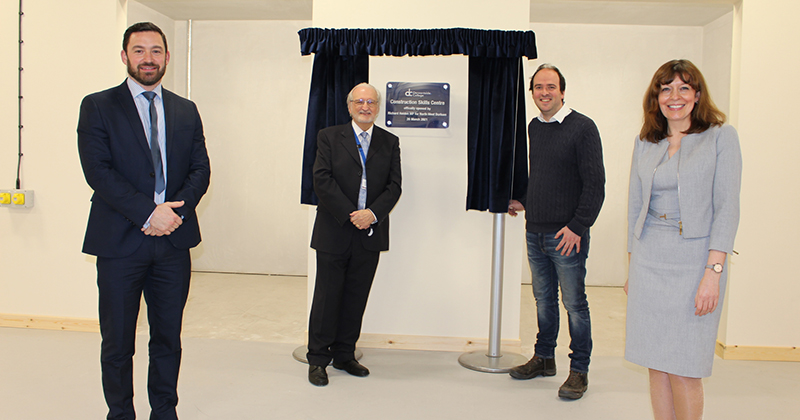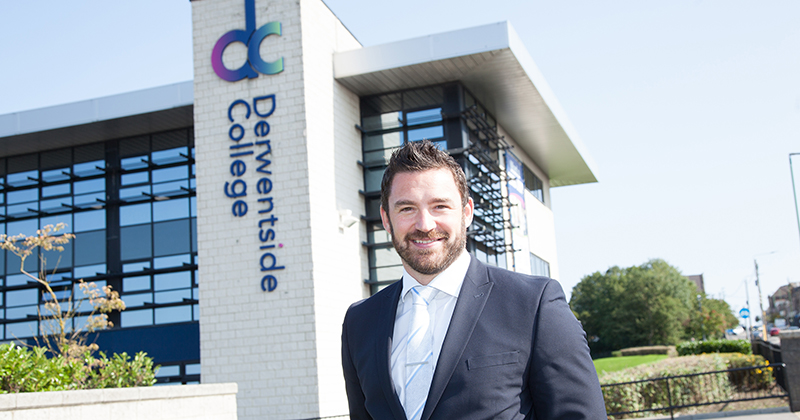If you enter Derwentside College after 2pm on a Friday, you’ll find it empty. The principal, Chris Todd, will be on his way to pick his seven-year-old son up from school and take him to the beach.
That’s because Todd, who is determined to prioritise well-being among his staff, allows them to finish early on Fridays. Employees also get a day off for their birthday and he’s “flirting with the idea” of employing a wellness coach to incentivise his leadership team to embrace a healthy lifestyle – the “secret to a happy workforce”.
With his bulging muscles, he’s the perfect healthy role model; Todd used to take part in powerlifting competitions and still “likes to beat the young guys in the gym”.
His wellbeing focus seems to be working.
Derwentside boasts a staff sickness rate of just 1 per cent and the college has come top out of 46 colleges for the past two years in staff survey benchmarking done by York College.
However, Todd is “very open” that staff satisfaction wasn’t always his priority. The 43-year-old has led Derwentside since he was 38, which might seem young for someone in such a senior position. But his first taste of the top job was as acting principal at Northumberland College at the tender age of 28.
“I don’t wear that as a badge of pride… I was definitely too young,” he says.
Todd is nowadays “very, very open” [“openness builds trust with staff”] to having been “ruthless” and made “mistakes” at Northumberland. But more on that later.

Sweet-talking the boss
That former ruthlessness perhaps came from being incredibly ambitious as a youngster, after digesting numerous self-help books by entrepreneurs such as Richard Branson. Being a devout atheist, Todd hated his catholic schooling in North Shields, where he was a “real little monkey” who “didn’t like being told what to do”. For that reason, after finishing his accountancy degree he only lasted three days training to be a police officer before quitting.
However, while temping at the local hospital in a role that involved leasing cars to doctors, he manoeuvred an opportunity for half an hour in a lease car with then-chief executive of the Northumbria Healthcare NHS Trust, Jim Mackey. His tactic of cornering and sweet-talking the boss worked; the next day, Mackey created a graduate role for Todd.
“I had a bit of a spark – you make your own opportunities, I always think”, he says.
He spent four years in the NHS and qualified as an accountant, but did not feel he could “make much of a difference” in such a “big and unwieldy” organisation.
The college buzz
It was in his next role at KPMG, which included auditing colleges, that he got his “first taste of FE”.
Colleges “had a buzz” when he stepped through the doors that other organisations lacked. “They have the best of the commercial world – it’s quite cutthroat, you’ve got to chase the income and student numbers,” Todd says. “But they also have a lovely moral purpose.”
Three years later, in 2007, a job came up at the Learning and Skills Council, which involved supporting colleges in financial difficulty.
The job gave Todd a “good overview” of the college finance landscape. He believes FE finance is “a simple business”, although “some people make it complicated”. “You need a fully costed curriculum plan and don’t get into too much debt. It’s not rocket science.”

Northumberland woes
One cash-strapped college Todd worked with was Northumberland, which asked him to become their finance director. The then-interim finance director, whom he replaced in 2009, told him the college would make a £900,000 loss at the end of that financial year. Todd concluded within weeks it was “more like £3.4 million”.
“The board was full of quite high calibre people, but they didn’t have a budget approved – just one page, ‘back of a fag packet’,” he says.
Todd had his work cut out. The college had “no curriculum plan”, “didn’t have a handle on income and had unrealistic targets”. He questioned the expenditure that had been signed off, which included funding research in the European wind industry for which Northumberland had already spent £300,000 with another £242,000 earmarked to pay that year.
“There were no discernible benefits to be derived from it,” he says. “We didn’t deliver any provision in the wind industry. Even if we did, nothing would have warranted a near-£600,000 investment.”
A year later, Todd was asked to step into the principal/chief executive role in a job share with former principal of Gateshead College David Cheatham. Unlike Todd, Cheatham (who was then in his sixties) had decades of FE experience. He worked two days a week and Todd the other three.
Merger misery
Todd says Cheatham was keen to embark on a merger with Newcastle College Group (NCG), but that “nobody in [Northumberland] wanted the merger” – including himself. “We got pushed down that route because of the position we were in.”
But the leadership team by then were starting to “turn the business around. So my view was it was big enough to be independent, we just needed more time. But it’s very hard to justify that to the funding agency when you’re a 28-year-old and the experienced guy is advocating the merger.”
After the initial merger round, Cheatham left and Todd made a U-turn on merging. NCG was apparently “not too happy” about Northumberland pulling out, but its then-chief was “not one for dwelling” on things.
Six months later, Northumberland’s permanent principal role was offered to someone else, much to Todd’s disappointment: “I thought it was mine. I felt like I’d done a great job.”
The ordeal took its toll on Todd, who recalls his time there as “really stressful. I was on my own a lot. I made loads of mistakes, which I learned from.”
Most of all, Todd regrets going “really hard on staff contracts”, which resulted in “lots of industrial unrest” and about 100 redundancies.
“Really, I’m a caring people-person and that was quite brutal,” he reflects. “I was ruthless at the time. I handle staff very differently now – with care and attention. I’ll make the hard decisions, but people shake my hand when they leave the business, whereas before they wouldn’t.”

Move to Derwentside
Todd “found” himself again in his next role as finance director of The Excel Academy Partnership, a multi-academy trust in Durham. That was thanks to its “lovely” chief executive Joan Sjøvoll, who sadly died a year later. But Todd found colleges “more interesting” than schools and was “hungry” to get “another bite of the cherry” in FE.
When he got an interview for the finance director position at Derwentside, he got cold feet because he thought the college, which has a £9 million turnover, was “too small”. He had to be “forced” to attend the interview by his wife.
“It turned out to be the best thing I ever did,” he says. Four years later he was back in the principal’s seat.
Just before Todd joined, the college closed its sixth form after competition from local academies made it unviable, and instead “threw everything into apprenticeships”.
With its large portfolio of apprenticeships, Derwentside is “the flip of a traditional FE college” and resembles more of an independent training provider. But although it has previously been an AELP member and has a “flight of foot commercial mindset”, Todd is proud of its college culture.
“The governance is professional, we’re not for profit and we reinvest in the college,” he says. “Some of the ITPs [independent training providers] tend to work where the margins are bigger, whereas we run some courses at a loss because it’s good for the community.”
Apprenticeships model
Because of Derwentside’s “small catchment for traditional FE activity”, it’s had to “adapt by being really good on the employer-facing work”.
But their model, which delivers most apprenticeships “fully in the workplace” rather than on “day release”, is “tough” – with “complex finance and delivery”.
Having training consultants working remotely means quality assurance systems “need to be really robust” and “you’ve got to make sure learners are being seen regularly”.
Whereas nationally, apprenticeship starts for 2022/23 fell by 3 per cent on the previous academic year, Derwentside has grown its by 10-15 per cent in the past two years. But it has also narrowed its offer from 80 standards to 38. The college’s large health and social care provision was “hammered in the pandemic”. Derwentside has “hung in there”, but doing so has affected its achievement rate.
Nationally, the drop-out rate for adult care apprenticeships last year was about 60 per cent and Todd believes it is impossible for any provider to get over 70 per cent achievement rates.
“A lot of people don’t finish those courses, and they’re low-funded so a lot of colleges have pulled out,” he says. “We’ve continued because there’s good local skills needs for it.”
College culture
When Todd stepped into the chief role five years ago, staff surveys were “not great”. He was keen to change that. His team came up with new values: trust, respect, excellence, innovation, and enjoyment. The latter was his idea, because “enjoyment is my mantra”. He meets every new staff member for an hour when they start, telling them: “I don’t ever want you to come to work and feel miserable.”
The college’s culture was praised by Ofsted when it inspected last October, rating it good. It said leaders “promote positive values and a supportive and inclusive culture”, and highlighted “low staff attrition”.

Fridays fundays
Todd believes it’s easier for smaller colleges like his to nurture a tightknit community feel.
But creating that culture was made harder because all his training consultants delivering apprenticeships in workplaces work remotely. Staff surveys showed they were the least satisfied cohort.
Todd’s team tackled this by creating a base room for them in the college, because “the more time they spend there, the more satisfied they are”. They’re also invited along with other staff to regular staff social events.
The most common way to keep staff happy is through a large pay rise, but in that respect, Todd has been thwarted. The government promised in July to pump nearly £500 million into colleges over the next two years towards pay rises, but Derwentside lost out because this came through the 16–19 funding formula.
The college has about 2,000 adults and 600 16- to 18-year-olds, which means while most colleges can now offer 6.5 per cent pay rises, Derwentside’s is 2 per cent.
Which comes back to Friday afternoons. Todd worked “really hard with the trade unions and staff to figure out other ways to make things better for them, instead of money”.
He believes having that time off has made staff more productive, including himself: “I work like a demon on Fridays until 2pm.”
Then it’s off to the beach in his hometown of Whitley Bay with his son, for ice cream (presumably of the healthy kind).









Your thoughts